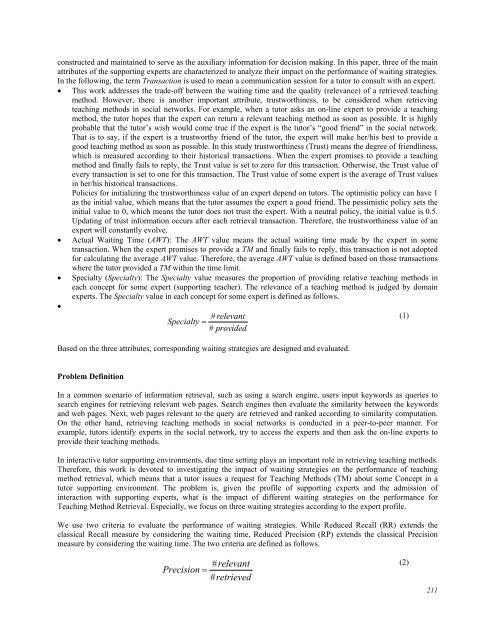October 2011 Volume 14 Number 4 - Educational Technology ...
October 2011 Volume 14 Number 4 - Educational Technology ...
October 2011 Volume 14 Number 4 - Educational Technology ...
Create successful ePaper yourself
Turn your PDF publications into a flip-book with our unique Google optimized e-Paper software.
constructed and maintained to serve as the auxiliary information for decision making. In this paper, three of the main<br />
attributes of the supporting experts are characterized to analyze their impact on the performance of waiting strategies.<br />
In the following, the term Transaction is used to mean a communication session for a tutor to consult with an expert.<br />
This work addresses the trade-off between the waiting time and the quality (relevance) of a retrieved teaching<br />
method. However, there is another important attribute, trustworthiness, to be considered when retrieving<br />
teaching methods in social networks. For example, when a tutor asks an on-line expert to provide a teaching<br />
method, the tutor hopes that the expert can return a relevant teaching method as soon as possible. It is highly<br />
probable that the tutor’s wish would come true if the expert is the tutor’s “good friend” in the social network.<br />
That is to say, if the expert is a trustworthy friend of the tutor, the expert will make her/his best to provide a<br />
good teaching method as soon as possible. In this study trustworthiness (Trust) means the degree of friendliness,<br />
which is measured according to their historical transactions. When the expert promises to provide a teaching<br />
method and finally fails to reply, the Trust value is set to zero for this transaction. Otherwise, the Trust value of<br />
every transaction is set to one for this transaction. The Trust value of some expert is the average of Trust values<br />
in her/his historical transactions.<br />
Policies for initializing the trustworthiness value of an expert depend on tutors. The optimistic policy can have 1<br />
as the initial value, which means that the tutor assumes the expert a good friend. The pessimistic policy sets the<br />
initial value to 0, which means the tutor does not trust the expert. With a neutral policy, the initial value is 0.5.<br />
Updating of trust information occurs after each retrieval transaction. Therefore, the trustworthiness value of an<br />
expert will constantly evolve.<br />
Actual Waiting Time (AWT): The AWT value means the actual waiting time made by the expert in some<br />
transaction. When the expert promises to provide a TM and finally fails to reply, this transaction is not adopted<br />
for calculating the average AWT value. Therefore, the average AWT value is defined based on those transactions<br />
where the tutor provided a TM within the time limit.<br />
Specialty (Specialty): The Specialty value measures the proportion of providing relative teaching methods in<br />
each concept for some expert (supporting teacher). The relevance of a teaching method is judged by domain<br />
experts. The Specialty value in each concept for some expert is defined as follows.<br />
<br />
# relevant<br />
(1)<br />
Specialty <br />
# provided<br />
Based on the three attributes, corresponding waiting strategies are designed and evaluated.<br />
Problem Definition<br />
In a common scenario of information retrieval, such as using a search engine, users input keywords as queries to<br />
search engines for retrieving relevant web pages. Search engines then evaluate the similarity between the keywords<br />
and web pages. Next, web pages relevant to the query are retrieved and ranked according to similarity computation.<br />
On the other hand, retrieving teaching methods in social networks is conducted in a peer-to-peer manner. For<br />
example, tutors identify experts in the social network, try to access the experts and then ask the on-line experts to<br />
provide their teaching methods.<br />
In interactive tutor supporting environments, due time setting plays an important role in retrieving teaching methods.<br />
Therefore, this work is devoted to investigating the impact of waiting strategies on the performance of teaching<br />
method retrieval, which means that a tutor issues a request for Teaching Methods (TM) about some Concept in a<br />
tutor supporting environment. The problem is, given the profile of supporting experts and the admission of<br />
interaction with supporting experts, what is the impact of different waiting strategies on the performance for<br />
Teaching Method Retrieval. Especially, we focus on three waiting strategies according to the expert profile.<br />
We use two criteria to evaluate the performance of waiting strategies. While Reduced Recall (RR) extends the<br />
classical Recall measure by considering the waiting time, Reduced Precision (RP) extends the classical Precision<br />
measure by considering the waiting time. The two criteria are defined as follows.<br />
# relevant<br />
Precision <br />
# retrieved<br />
(2)<br />
211

















